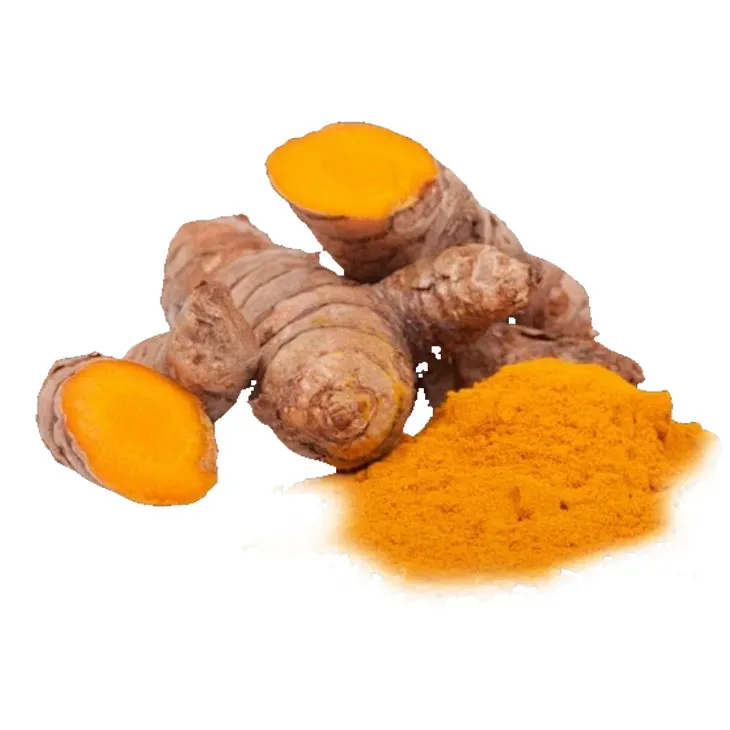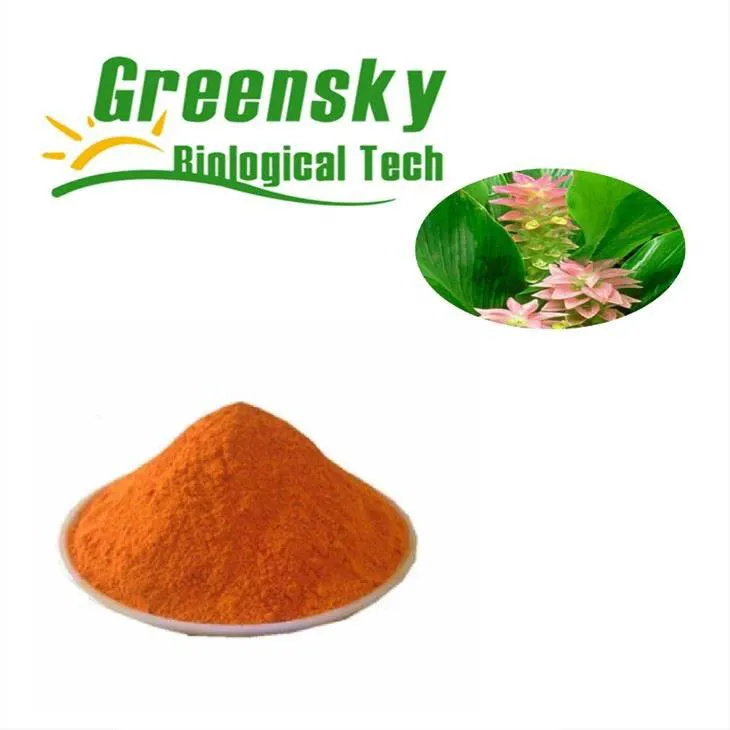- 0086-571-85302990
- sales@greenskybio.com
The Magic of Curcumin Powder: A Comprehensive Guide
2024-11-13

1. Introduction to Curcumin Powder
Curcumin powder is derived from the rhizome of the turmeric plant (Curcuma longa). It is the main bioactive compound in turmeric, which gives the spice its characteristic yellow color. For centuries, turmeric has been used in traditional medicine systems such as Ayurveda in India and traditional Chinese medicine. Curcumin powder has recently gained significant attention in the modern world due to its potential health benefits.

2. Curcumin in Traditional Medicine
2.1 Ayurvedic Medicine
In Ayurveda, turmeric is considered a "rasayana," a substance that promotes longevity and overall well - being. It has been used to treat a variety of ailments, including digestive disorders, skin diseases, and joint pain. Curcumin, being the key component of turmeric, is believed to have anti - inflammatory, antioxidant, and antimicrobial properties that contribute to its therapeutic effects in Ayurvedic medicine.
2.2 Traditional Chinese Medicine
Similarly, in traditional Chinese medicine, turmeric has been used for its blood - activating and stasis - resolving properties. It has been applied in the treatment of abdominal pain, jaundice, and menstrual disorders. Curcumin powder is thought to play a crucial role in these applications by modulating the body's internal environment and promoting balance.

3. Modern Research Findings on Curcumin Efficacy
3.1 Anti - inflammatory Properties
One of the most well - studied aspects of curcumin is its anti - inflammatory effect. Chronic inflammation is associated with many diseases, such as arthritis, heart disease, and cancer. Research has shown that curcumin can inhibit the production of inflammatory cytokines and enzymes, thereby reducing inflammation at the molecular level. For example, in a study on patients with rheumatoid arthritis, curcumin supplementation was found to significantly reduce joint pain and swelling.
3.2 Antioxidant Activity
Curcumin is also a powerful antioxidant. It can scavenge free radicals, which are unstable molecules that can damage cells and DNA. By neutralizing free radicals, curcumin helps protect the body against oxidative stress, which is implicated in aging and various diseases. In vitro studies have demonstrated that curcumin is more effective than some common antioxidants in preventing oxidative damage.
3.3 Anti - cancer Potential
There is growing evidence suggesting that curcumin may have anti - cancer properties. It can interfere with multiple cellular processes involved in cancer development, including cell proliferation, apoptosis (programmed cell death), and angiogenesis (formation of new blood vessels that supply tumors). Although more research is needed, some pre - clinical and early - stage clinical trials have shown promising results in using curcumin as an adjunct therapy for cancer treatment.

4. Uses of Curcumin Powder in Food
4.1 Culinary Applications
Curcumin powder is widely used in cooking, especially in South Asian, Middle Eastern, and North African cuisines. It is a key ingredient in curry powders, adding flavor, color, and a characteristic aroma to dishes. In addition to its use in traditional recipes, curcumin powder has also found its way into modern fusion cuisine, where it is used to add an exotic touch to various dishes.
- It can be used to season meats, vegetables, and grains.
- It is often added to soups, stews, and casseroles for both flavor and color.
4.2 Functional Foods
With the increasing awareness of its health benefits, curcumin powder is being incorporated into functional foods. These are foods that are designed to provide additional health benefits beyond basic nutrition. For example, curcumin - enriched drinks, such as turmeric lattes, have become popular in recent years. Some food manufacturers are also adding curcumin powder to energy bars, cereals, and yogurts.

5. Uses of Curcumin Powder in Cosmetics
5.1 Skin Health
Curcumin powder has potential benefits for skin health. Its antioxidant and anti - inflammatory properties make it suitable for use in skincare products. It can help protect the skin from environmental damage, reduce inflammation associated with skin conditions such as acne and eczema, and may even have anti - aging effects. Many cosmetic companies are now including curcumin in their formulations for creams, lotions, and serums.
5.2 Hair Care
In addition to skin care, curcumin powder may also be beneficial for hair health. It can help improve scalp health by reducing inflammation and fighting off infections. Some natural hair care products contain curcumin powder as an ingredient to promote hair growth and strengthen hair follicles.

6. Uses of Curcumin Powder in Pharmaceuticals
6.1 Drug Development
The potential of curcumin in treating various diseases has led to interest in its use in drug development. However, there are challenges associated with formulating curcumin into effective drugs. One of the main issues is its low bioavailability, which means that only a small amount of the ingested curcumin actually reaches the target tissues in the body. Researchers are exploring different strategies to overcome this problem, such as using nanoparticle - based delivery systems or combining curcumin with other substances to enhance its absorption.
6.2 Dietary Supplements
Despite the challenges in drug development, curcumin powder is widely available as a dietary supplement. These supplements are marketed for their potential health benefits, such as reducing inflammation, improving joint health, and enhancing the immune system. However, consumers should be cautious when choosing curcumin supplements, as the quality and effectiveness can vary depending on the source and formulation.
7. Challenges in Using Curcumin Powder Effectively
7.1 Bioavailability
As mentioned earlier, low bioavailability is a major challenge in using curcumin powder effectively. Curcumin is poorly absorbed in the intestine and is rapidly metabolized and excreted from the body. This limits its effectiveness when taken orally in its pure form. Strategies to improve bioavailability, such as taking curcumin with black pepper (which contains piperine, a substance that can enhance curcumin absorption), or using specialized formulations, are being explored.
7.2 Stability
Curcumin powder is also relatively unstable under certain conditions. It can degrade when exposed to light, heat, and oxygen, which can reduce its potency. To maintain the stability of curcumin powder, it should be stored in a cool, dry place, away from direct sunlight. Manufacturers are also developing more stable formulations, such as encapsulating curcumin in protective coatings to prevent degradation.
8. Solutions to Overcome the Challenges
8.1 Formulation Innovations
To address the bioavailability issue, researchers are developing new formulations of curcumin powder. Nanoparticle - based formulations have shown promise in improving the absorption and delivery of curcumin to target tissues. Liposomal curcumin, for example, encapsulates curcumin in lipid vesicles, which can protect it from degradation and enhance its uptake by cells. Another approach is to combine curcumin with other bioactive compounds to create synergistic effects that can improve its overall effectiveness.
8.2 Standardization and Quality Control
To ensure the effectiveness and safety of curcumin powder products, standardization and quality control are essential. This includes setting standards for the purity, potency, and stability of curcumin powder. Manufacturers should follow good manufacturing practices (GMP) to ensure that their products meet the required quality standards. Regulatory agencies also play a role in monitoring and approving curcumin - based products to protect consumers.
9. Conclusion
Curcumin powder is truly a wonder substance with a wide range of potential benefits in traditional medicine, modern research, food, cosmetics, and pharmaceuticals. While there are challenges in using it effectively, such as low bioavailability and stability issues, ongoing research is providing solutions through formulation innovations and quality control measures. By understanding the properties and potential of curcumin powder, we can make informed decisions about incorporating it into our daily lives for a healthier future.
FAQ:
What is curcumin powder?
Curcumin powder is a natural compound derived from the turmeric plant. It is responsible for the bright yellow color of turmeric and has been used for centuries in traditional medicine. Chemically, it belongs to the curcuminoids family and has various beneficial properties.
What are the traditional uses of curcumin powder in medicine?
In traditional medicine, curcumin powder has been used for its anti - inflammatory, antioxidant, and antimicrobial properties. It has been used to treat various ailments such as digestive problems, skin diseases, and joint pain. For example, in Ayurvedic medicine, it is often used to balance the body's doshas and promote overall health.
What do modern research findings say about the efficacy of curcumin powder?
Modern research has shown that curcumin powder has a wide range of potential health benefits. It has been studied for its anti - cancer properties, as it may be able to inhibit the growth of cancer cells. It also has anti - inflammatory effects that can be beneficial for conditions like arthritis. Additionally, it may help in improving brain function and reducing the risk of neurodegenerative diseases such as Alzheimer's.
How is curcumin powder used in food?
Curcumin powder is widely used as a spice in food. It adds color and flavor to dishes. It is a key ingredient in curry powders and is often used in Indian, Middle Eastern, and Southeast Asian cuisines. It can be added to rice, vegetables, meats, and soups. Some people also use it to make turmeric latte for its potential health - promoting properties.
What are the applications of curcumin powder in cosmetics?
In cosmetics, curcumin powder is used for its antioxidant and anti - inflammatory properties. It can be found in skincare products such as creams and serums. It may help in reducing skin inflammation, improving skin complexion, and protecting the skin from oxidative stress. Some products claim that it can also help in reducing the appearance of wrinkles and fine lines.
Related literature
- The Chemistry and Biological Activities of Curcumin"
- "Curcumin: A Review of Its' Effects on Human Health"
- "Therapeutic Potential of Curcumin in Medicine"
- ▶ Hesperidin
- ▶ Citrus Bioflavonoids
- ▶ Plant Extract
- ▶ lycopene
- ▶ Diosmin
- ▶ Grape seed extract
- ▶ Sea buckthorn Juice Powder
- ▶ Fruit Juice Powder
- ▶ Hops Extract
- ▶ Artichoke Extract
- ▶ Mushroom extract
- ▶ Astaxanthin
- ▶ Green Tea Extract
- ▶ Curcumin
- ▶ Horse Chestnut Extract
- ▶ Other Product
- ▶ Boswellia Serrata Extract
- ▶ Resveratrol
- ▶ Marigold Extract
- ▶ Grape Leaf Extract
- ▶ New Product
- ▶ Aminolevulinic acid
- ▶ Cranberry Extract
- ▶ Red Yeast Rice
- ▶ Red Wine Extract
-
Mangosteen extract powder
2024-11-13
-
Bitter Melon Extract
2024-11-13
-
Shikonin
2024-11-13
-
American Ginseng Root Extract
2024-11-13
-
Fenugreek Extract Powder
2024-11-13
-
Lavender Extract
2024-11-13
-
Black Garlic Extract
2024-11-13
-
Camu Camu Extract
2024-11-13
-
Buckthorn bark extract
2024-11-13
-
Apricot Powder
2024-11-13





















